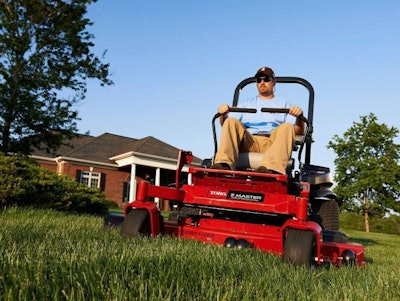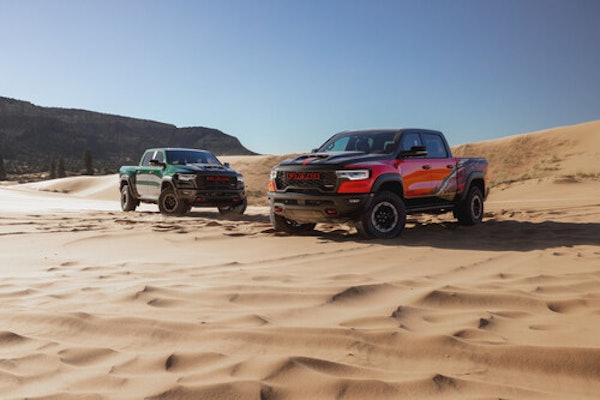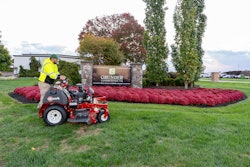
Reinhart says it’s natural for a company to go to larger, zero-turn mowers as the properties they maintain get larger and their days get longer, but he discovered big zero-turn machines can be overkill for smaller properties.
“As we went to larger and faster machines, we started to get complaints from some customers about turf damage and compaction,” Reinhart says. “We were simply using the wrong mower in the wrong place.”
Reinhart found in small areas bigger mowers didn’t allow for alternate mowing directions and forced operators to turn around in the same spot, which led to ruts.
“We were using the Exmark XS, but are downsizing to the Exmark Lazer Z, which is almost 200 pounds lighter and has better weight distribution.”
Randy Harris, senior marketing manager, The Toro Company, says if a landscaper’s typical terrain is rolling hills, large 72-inch decks often don’t provide the best after-cut appearance. “Sometimes they can cause scalping of the turf,” he says. “A contractor may want to consider a Toro Z Master with a 48-inch or 52-inch deck, which is still productive because of the speed of the machine, yet it delivers more flexibility, maneuverability and access to tighter spaces.”
Harris recommends sub-compact models with 34-inch and 40-inch decks to landscapers who need to get through narrow pedestrian gates. “Traditionally, mid-size walk-behinds have been used in such settings.”
Service is key
Proper maintenance with your zero-turn mower is important for achieving peak performance and therefore optimal productivity.
“Mowers breathe easier with a clean air filter,” Harris says. “A dirty one can lead to poor engine performance, excessive fuel consumption, and in the worst case, premature engine failure. Dirt that’s allowed to enter the engine acts like sandpaper, grinding between metal parts.”
Reinhart advises changing blades every other day, changing oil every hundred hours, and greasing with every other blade change. Anything more than general mower maintenance is taken to the dealer.
“You have to have service, because downtime costs money,” Reinhart says. “To us, the dealer is as important as the quality of the piece of equipment. Part of our business success is due to the quality of the relationship we have with our vendors. Most of our dealers are committed to giving us around-the-clock service, loaner equipment, and most will even deliver and pick up the equipment. They value our business and we value their service.”
Fuel options
Diesel-power mowers can help with fuel savings, according to Harris, but a contractor may want them only if they are running other diesel machines in their fleets. “Contractors using off-road diesel can save money by avoiding certain fuel taxes,” he says. “Even when diesel fuel isn’t less expensive, it’s more efficient to burn, and the machines offer higher torque and responsiveness under challenging conditions.”
Some manufacturers such as Exmark offer zero-turns powered by propane and propane conversion kits for older machines. Besides the environmental benefits of this clean-burning fuel, there are economic advantages. “According to the Propane Education and Research Council, propane’s octane rating is 104, compared with premium gasoline at 91 or 92, allowing for a higher compression ratio in the engine and greater engine efficiency,” says John Cloutier Sr., marketing manager, Exmark.
The same maneuverability that the zero-turn radius power unit provides for mowing is also advantageous for snow removal, aeration, spraying, edging and leaf cleanup.
“You can boost productivity across a wide range of services by choosing a zero-turn power unit that easily adapts to multiple implements,” says Ray Garvey, equipment specialist, Grasshopper. “A front-mount aerator, for example, eliminates the need for a single purpose machine and yet costs approximately the same or less than walk-behind units while tripling or quadrupling productivity.”
Warranties translate to profit
Landscapers should look closely at the product’s warranty period, during which there should be little budget required for upkeep. “Some landscapers look to upgrade their equipment every couple of years to keep warranty plans in effect to minimize parts and repair budgets,” Garvey says.







